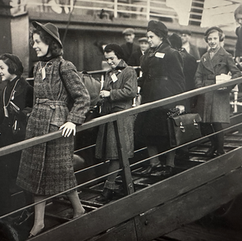‘We were thrown around by the tides of history’: Kinder interviews in the Archive
- AJR Refugee Voices team
- Nov 24, 2023
- 4 min read

One of my first interviews with a former Kind was with Richard Grunberger, one of the former editors of the AJR Journal. He had come from Vienna, as a 15-year-old, was first sent to Dovercourt reception camp and then found a position as a domestic servant with an English family, who was related to the later prime minister Sir Anthony Eden. Richard did not last very long in that position and he felt that he was not shown much understanding for his situation as an unaccompanied child refugee. By chance, he met a Jewish family from the East End who took him in and where he lived for eight years. When I asked him how his life had been affected by his refugee experience, he answered:
‘I have been at the receiving end of that whole experience, as somebody who was totally passive. I was just thrown around by the tides of history’
That phrase ‘thrown around by the tides of history’ has stuck with me and I have used in a few times for a title for a lecture on the Kindertransport. While you could argue that this concept applies to any refugee or displaced person, it seems to really encapsulates the child refugee experience, whose lives were turned upside down and deeply impacted by the decision of their parents to send them on a Kindertransport to safety in Britain and by the decisions made by the various agencies and foster families responsible for them, once they arrived in the UK.
More than 20 years have passed since I interviewed Richard Grunberger and I am proud to say that the AJR Refugee Voices has since interviewed 80 Kinder. It is the largest single experience in the entire archive and constitutes one of the largest collection of Kinder interviews in the UK. These interviews have been used in exhibitions, films, educational material (including Stolpersteine in Germany), and in a wide range of research projects. The youngest Kind in our archive is Sir Erich Reich, the former trustee of the AJR and chairman of the AJR’s Kindertransport Special Interest Group, who came to Britain from Vienna aged four. 12 other interviewees were under the age 9, when they arrived in the UK. The group of older Kinder, such as Richard Grunberger, born between 1922 and 1925, by far forms the largest group of 41 Kinder in this collection.

These in- depth interviews offer an enormous insight into many aspects of the Kindertransport, from the point of view of the Kinder who experienced it and they illustrate a huge diversity of experiences and lived lives. The most striking similarity across all interviews is the frequent movement of the Kinder in their early years of post-emigration: in between foster families, hostels, farms, educational camps, schools and boarding schools. When listening to the stories, it becomes apparent how complex the process of ‘settling’ was and that the children were often exposed to random decisions by various agencies, sometimes in conflict with other family members.
These interviews also give a voice and an image to the families of the Kinder, left behind in Germany, Austria, and Czechoslovakia, in forms of letters, documents, and photographs, filmed at the end of the interviews. One of these captured documents is the very moving inscription in a prayer book given to Ursula Gilbert by her father Ferdinand Brann, in which he wrote down 10 guidelines for her new life in England.
It is extraordinary that among the many photographs captured, are four photographs of four interviewees on the journey of the Kindertransport to the UK. Bea Green MBE is captured leaving Munich Station, Leslie Baruch Brent MBE is photographed with a group of other children on a train, Edith Fulton is photographed walking down from the boat and Vera Schaufeld MBE is captured standing on a platform with some relatives in Holland. Another extraordinary historical treasure is unearthed in the interview with Leslie Baruch Brent. We filmed him listening to his own voice, recorded in 1939 for a BBC broadcast on Dovercourt Reception camp, talking about the daily routine of the Kinder who had just arrived in the UK.
Another of my early Kinder interviews was conducted with Prof. Emeritus Julius Carlebach, the son of the last chief rabbi of Hamburg, Joseph Carlebach. Julius was one of nine children and was sent with one of his sisters on a Kindertransport to the UK. In the interview he describes the experience of the children as follows:
For many of them the whole world changed, because where you thought you broke off, that wasn’t the break, that was an abyss’.
As we are approaching the 85th anniversary of the Kindertransport, I feel that it is important to acknowledge that ‘abyss’. We need to understand that narratives of resilience, coping and empowerment stand side by side traces of rupture, trauma and lack of agency in most Kinder interviews. We also need to acknowledge that for some Kinder it was not easy to give testimony. This was made very clear to me in the first Refugee Voices Kinder interview for Refugee Voices with Marion Lesser. When I asked her at the end of the interview if she spoke about her experiences to her children she answered in tears:
‘Yes, yes, not easily, not easily…. yes, it’s hard to go back… I believe in letting sleeping dogs lie. Don’t try and unravel it all and start all over again’
I am grateful to all the Refugee Voices Kinder interviews who had the courage ‘to go back’ and share their memories with the Archive, so that future generations can listen and learn from their experiences as unaccompanied minors who arrived in Britain from November 1938 to September 1939.
— Dr. Bea Lewkowicz












